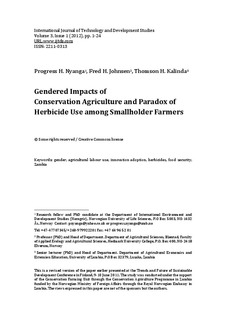Gendered impacts of conservation agriculture and paradox of herbicide use among smallholder farmers
Journal article, Peer reviewed

Åpne
Permanent lenke
http://hdl.handle.net/11250/134534Utgivelsesdato
2012Metadata
Vis full innførselSamlinger
Originalversjon
Nyanga, P.H., Johnsen, F.H. & Kalinda, T.H. (2012). Gendered impacts of conservation agriculture and paradox of herbicide use among smallholder farmers. International Journal of Technology and Development Studies, 3(1), 1-24Sammendrag
Conservation Agriculture (CA) is increasingly taking a central stage in agricultural
policies and rural development among developing countries like Zambia. The challenge of
gender gaps in agriculture has persisted despite efforts of gender mainstreaming. This paper
assesses gender based impacts of conservation agriculture (CA) basins among smallholder
farmers under the Conservation Agriculture Programme (CAP) in Zambia. Qualitative and
quantitative approaches were used to collect data. Quantitative data was analysed mainly
by descriptive statistics and qualitative data by thematic and content analysis. Results
indicated that women and children experienced reduction in labour with respect to clearing
of fields before tillage and during weeding where herbicides were used correctly.
Improvement in household food security was also reported. Digging of CA basins was labour
intensive and the chaka hoe was heavy for women. Labour requirement for women and
children was more than for men during hand weeding. Herbicides have increased labour
requirements for men because they are predominantly involved in spraying. Women needed
to reduce their labour during weeding but feared that the use of herbicides would increase
food insecurity during hunger peak period. This was because the use of herbicides is
inconsistent with the practice of mixed cropping and selection of valuable wild vegetables
that were important for food security. Results suggest that usage of herbicide such as
atrazine could have health concerns that may affect women more than men. Use of
herbicides raises questions as to what extent CA is environmentally sustainable.
Interventions in CA need to be both gender sensitive and minimise tradeoffs between health
concerns, socio-economic benefits and environmental sustainability.